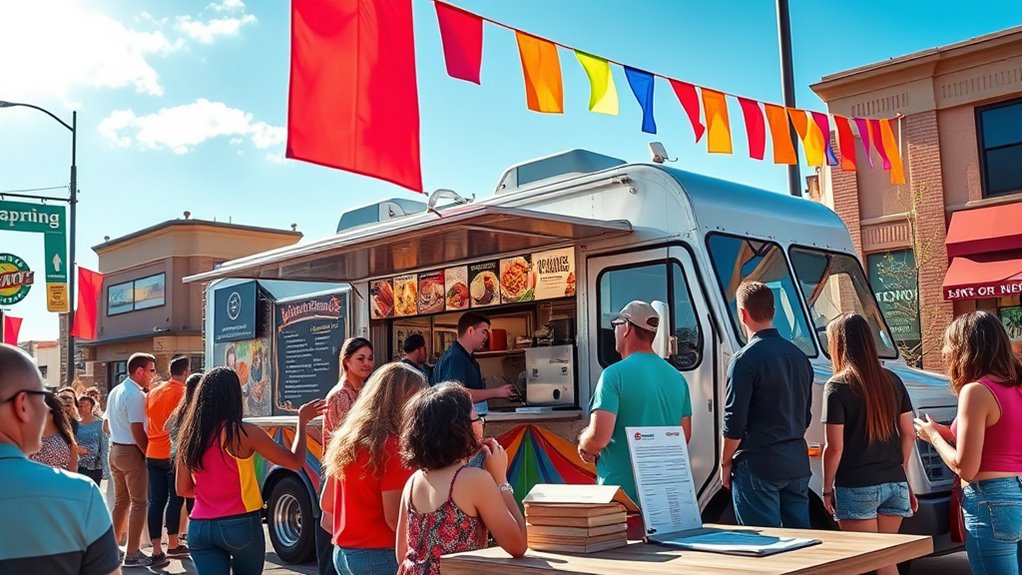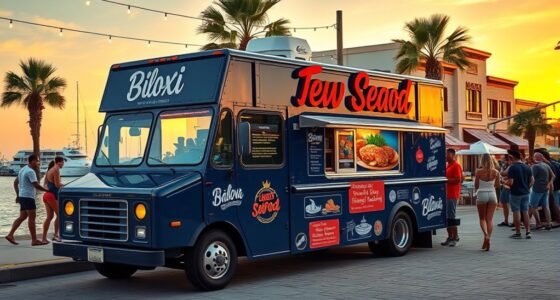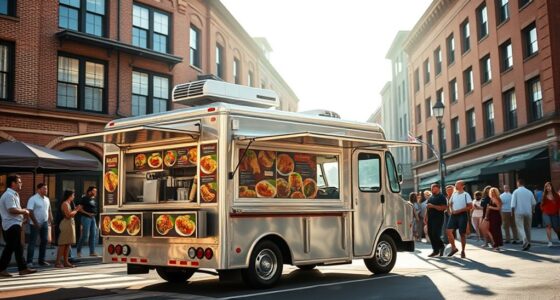To open a food truck in Provo, Utah, you’ll need to secure several permits, including a Vendor Permit, Food Truck Permit, Business License, and Sales Tax Permit, along with Food Handler Permits for staff. Budget for truck costs, equipment, licensing fees, and marketing, typically totaling $30,000 to $200,000. Choose an approved location that complies with zoning laws and develop a menu that meets health standards. If you continue, you’ll learn more about maneuvering each step successfully.
Key Takeaways
- Obtain necessary permits including Vendor, Food Truck, Business License, and Sales Tax Permit from Provo and Utah authorities.
- Budget approximately $30,000 to $200,000 for truck purchase, equipment, permits, insurance, and marketing expenses.
- Operate within designated commercial zones, maintaining proper distances from other food establishments and complying with land use regulations.
- Develop a compliant menu focusing on food safety, using approved commissary kitchens and following health department guidelines.
- Schedule inspections early, gather all documentation digitally or in person, and develop a marketing plan to attract customers.
Navigating Permits and Licensing Requirements in Provo
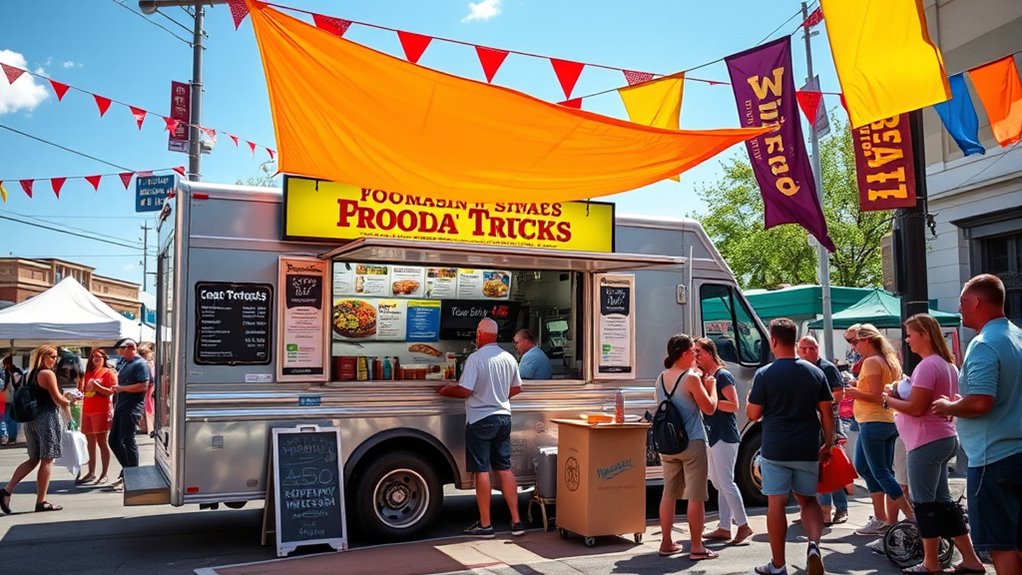
Managing permits and licensing requirements in Provo can seem complex, but understanding the process is essential for legally operating your food truck. First, you need a Vendor Permit from the Community and Neighborhood Services Department, which allows you to run a mobile food business. Next, obtain a Food Truck Permit from the local health department, ensuring you meet health and safety standards. A Business License from Provo City is also required to operate legally. Additionally, you must secure a Sales Tax Permit from the Utah State Tax Commission to collect sales tax. Every employee handling food needs a Food Handler Permit, certifying safe food practices. Collecting and submitting necessary documents—such as vehicle registration, insurance, and health permits—is vital. Staying informed about regulatory updates can help you maintain compliance and avoid penalties. Keep in mind, permits often need renewal annually, so stay updated on expiration and renewal requirements. Applying early and maintaining compliance helps prevent delays and ensures smooth operation.
Understanding the Application Process and Timing
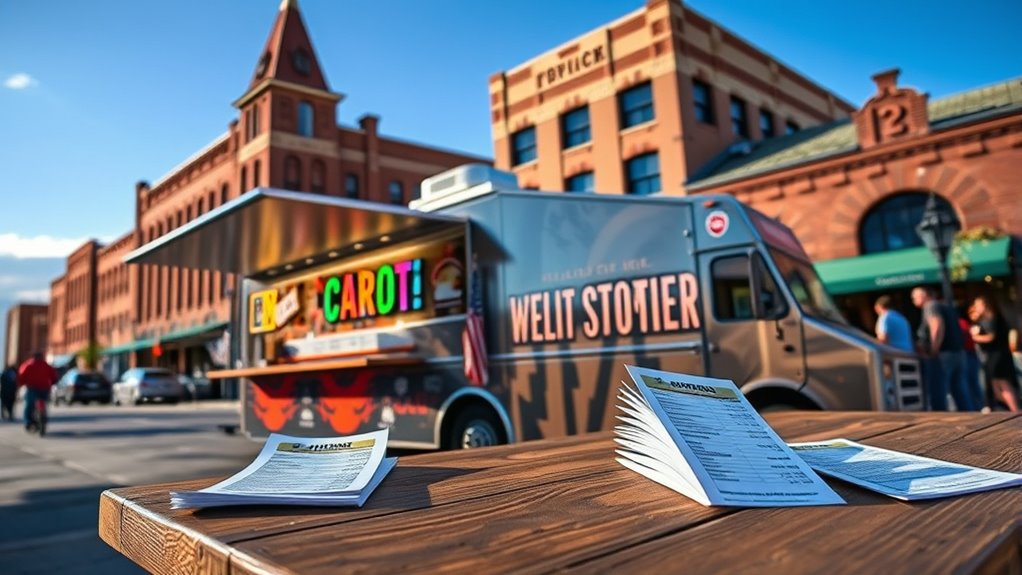
Understanding the application process and timing is key to launching your food truck in Provo smoothly. First, consult with Provo City Community and Neighborhood Services to clarify permit requirements based on your vendor type and location. Before applying, obtain your Employer Identification Number (EIN) from the IRS online and register your business entity with Utah’s Division of Corporations. Develop a detailed business plan and secure necessary insurance, including a Certificate of Insurance (COI). Submit all required documents—applications, health permits, insurance certificates, vehicle or site plans—either online or in person. The review process can take several months to a year, depending on completeness. Schedule inspections early, as health, fire, and public works assessments may extend your timeline. Organizing documentation and communication guarantees a smoother approval process. Additionally, understanding the permitting regulations and compliance standards related to food trucks can help prevent delays and ensure adherence to local ordinances.
Estimating Costs and Fees for Starting Your Food Truck
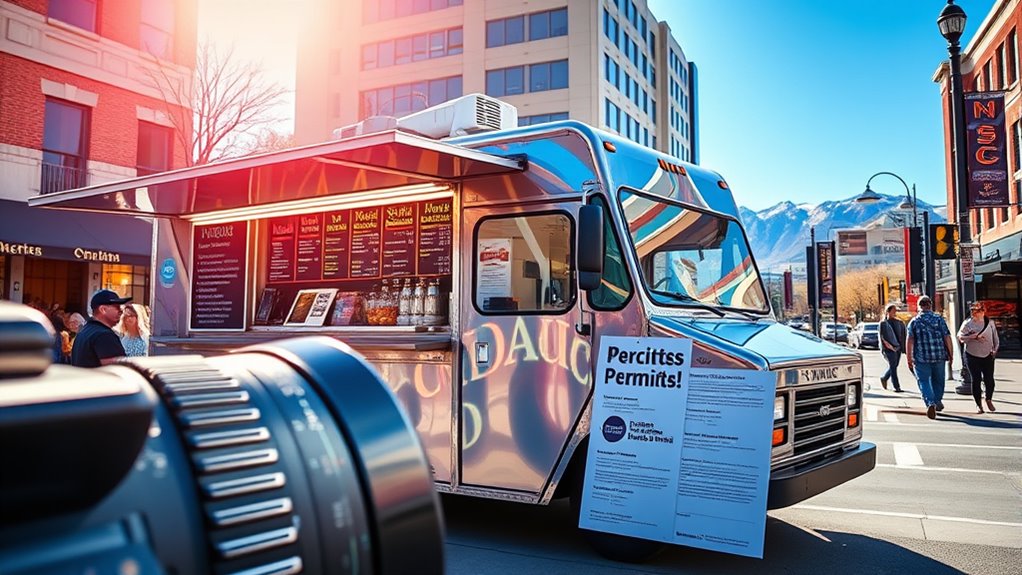
Estimating the costs and fees to start your food truck involves carefully considering several key expenses. Your initial truck purchase can range from about $30,000 for a used vehicle to $200,000 for a new one. Kitchen equipment, including grills, fryers, and ovens, may add another $2,500 to $15,000, depending on size and brand. Refrigeration and sanitation supplies typically cost $2,500 to $5,500. Permits and licenses in Utah generally fall between $350 and $500, with additional local inspection fees possibly adding a few hundred dollars. Insurance costs start around $1,000 annually for liability coverage. Finally, inventory, branding, and marketing expenses can total between $3,000 and $7,000, depending on your menu complexity and promotional needs. Understanding local permit requirements is crucial to ensure compliance and avoid unexpected costs down the line. Additionally, researching food truck regulations can help you anticipate other potential expenses and operational considerations.
Choosing Suitable Locations and Adhering to Land Use Rules
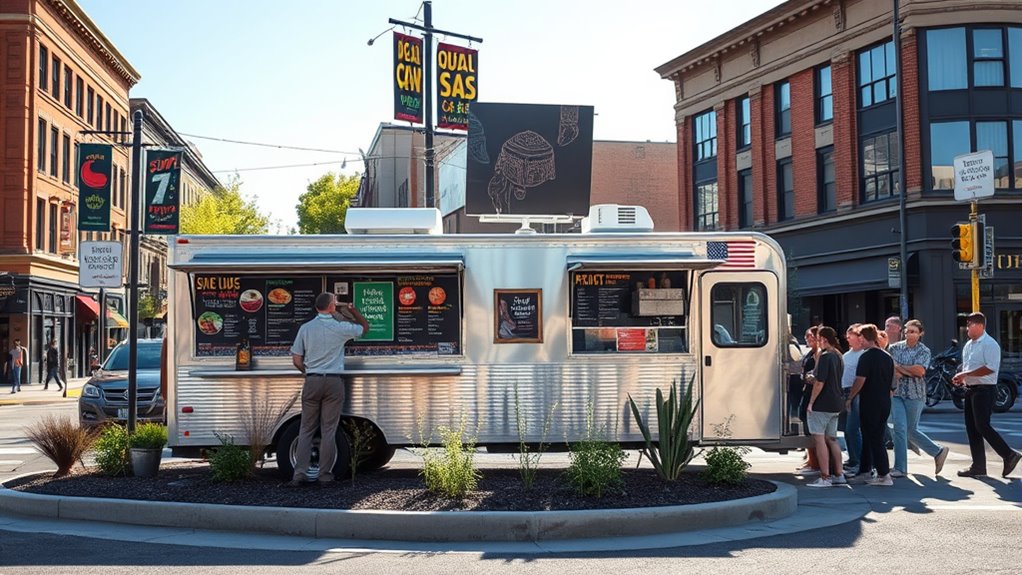
Selecting the right location for your food truck is essential to attracting customers and staying compliant with Provo’s land use rules. You need to operate within designated commercial or mixed-use zones, avoiding strictly residential areas unless you get special approval. Be aware of proximity restrictions—your truck must stay at least 200 feet from other restaurants, food trucks, or certain events to prevent competition issues. Check local zoning laws and land use plans, which include setbacks from buildings and fire lanes. Guarantee your chosen spot complies with fire and health inspections, provides access to potable water, and doesn’t block sidewalks or traffic. Securing the proper permits, licenses, and approvals from health, fire, and public works departments is essential before setting up. Understanding local regulations can help you navigate these requirements more effectively. Additionally, being aware of home-based food truck restrictions can prevent potential legal complications.
Developing Your Menu and Ensuring Food Safety Compliance
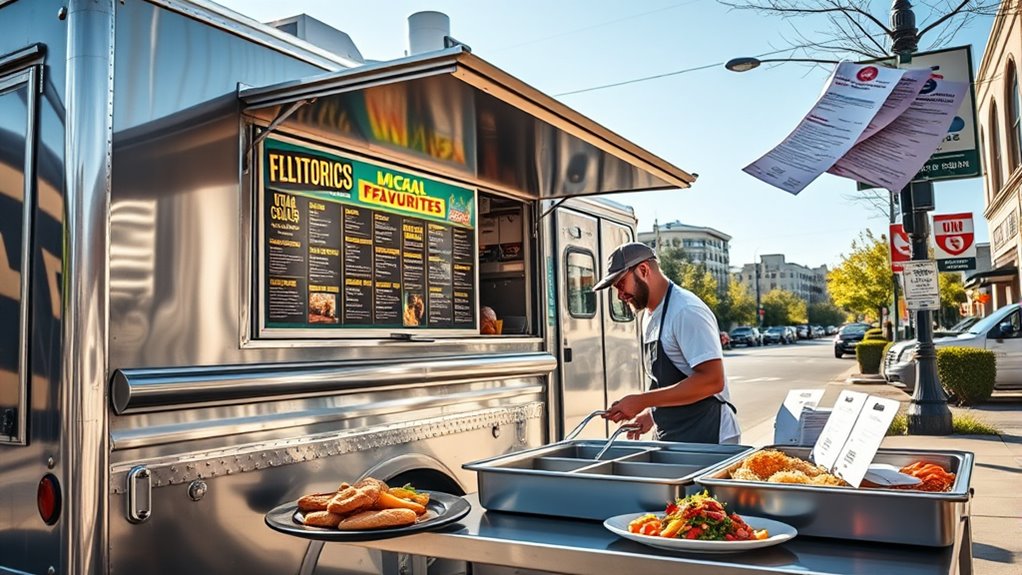
Choosing the right location for your food truck sets the foundation for attracting customers and staying compliant with local land use rules. When developing your menu, categorize foods based on risk: “TCS foods” require higher-tier permits, especially if including raw animal products. Limiting TCS items can reduce permit fees and inspection scrutiny. Verify your menu is prepared in an approved commissary kitchen, which must meet state and local codes for sanitation. Use utensils or gloves instead of bare hands for ready-to-eat foods to prevent contamination. All staff must follow safe handling rules, and a certified food safety manager should oversee operations. Your truck needs proper sinks, sanitation supplies, and approved water and waste disposal systems. Submit your menu and layout plans for health department review before starting operations. Incorporating proper food safety practices can help prevent foodborne illnesses and ensure smooth inspections.
Frequently Asked Questions
Are There Restrictions on Operating Hours for Food Trucks in Provo?
Yes, there are restrictions on your food truck’s operating hours in Provo. You can’t operate more than 18 hours within any 24-hour period at the same location, and all activities must be temporary. You also need to avoid noise disturbances, litter, or blocking access. Be aware of proximity limits near restaurants, and make sure your hours conform to health department and city regulations to avoid fines or permit issues.
How Do I Find Approved Event Locations for Food Trucks?
They say “the early bird catches the worm,” so start by reaching out to local event centers like Sparks Museum or Clarion Event Center to verify approved food truck spots. Check municipal event calendars and contact venue managers to confirm permit requirements and logistics. Networking with established food trucks can also reveal popular, recurring locations. Always make sure you have the proper permits and insurance before setting up.
What Insurance Coverage Is Required to Operate Legally?
You need to have the right insurance coverage to operate legally. Make sure you carry general liability insurance with at least $1 million per occurrence, and commercial auto insurance for your truck. If you’re using a trailer, extend coverage to it. Also, consider foodborne illness liability and employee injury protection. Providing proof of these policies, like Certificates of Insurance, is essential for permits and event participation in Provo.
Can I Operate My Food Truck Year-Round in Provo?
Can you really keep your food truck rolling through Provo’s icy winters? Yes, you can, but it’s not without challenges. Weather conditions may slow customer traffic, and you’ll need to follow health and safety inspections year-round. Proper vehicle maintenance, strategic location choices, and seasonal menu adjustments become your allies. As long as you’re prepared for the cold, your year-round operation can thrive, turning winter’s chill into your advantage.
Are There Specific Signage or Branding Regulations to Follow?
You should follow Provo’s signage and branding rules carefully. Your signs must meet local zoning codes for size, placement, and illumination, and avoid obstructing walkways or traffic sightlines. You’ll need approval for temporary signs and verify lighting complies with safety standards. Also, your branding can’t include misleading claims or offensive content. Submit detailed signage plans with your permits, and stay compliant to avoid fines or license issues.
Conclusion
Starting your food truck in Provo is like planting a seed in fertile ground—nurture it with permits, costs, and location choices, and watch it blossom into a vibrant street culinary oasis. With careful planning and passion fueling your journey, you’ll steer through the maze of regulations and menus, transforming your dream into a flavorful reality. Embrace the adventure ahead, and let your food truck become a beacon that lights up Provo’s bustling streets.
